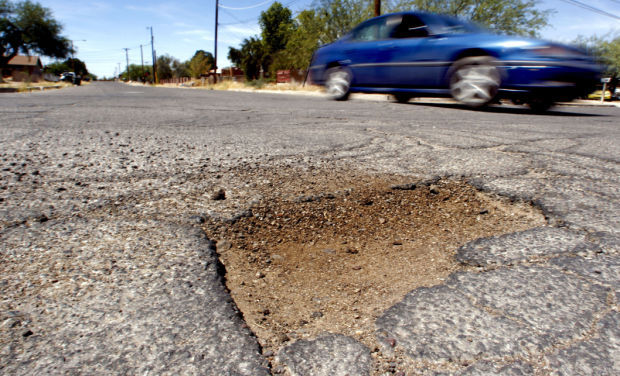Roads in Pima County remain in poor condition, and the organizer of a new website and Facebook page wants to make sure no one, especially elected leaders and those who want to get elected, forgets.
Tucson attorney Phil Larriva is one of the people behind an effort called Fix Our Pima County Roads.
“It is an election-year effort to increase public awareness of candidates’ positions, solutions and commitments to Fix Our Pima County Roads,” Larriva told Road Runner by email.
The road-repair Facebook page has gotten more than 900 likes since it first started posting items around January.
The posts include photos of potholes people send to the organizer and a lot stories from the Arizona Daily Star about transportation and infrastructure funding.
While the Facebook page has a measure of the sniping and name-calling from commenters that such forums inevitably attract, Larriva seems genuinely earnest in moving beyond political finger-pointing.
Rather, he’s searching for solutions to an impending crisis in our transportation infrastructure.
“The scope and extent of the road problem requires less spending for other things and increasing revenue for road preservation and maintenance,” he wrote to Road Runner. “Increasing revenue by way of gas taxes, a Pima County half-cent sales tax and/or passing bonds for only street-specific road preservation, maintenance and reconstruction (not new roads) is probably necessary.”
Larriva asks an important question in all this: If there won’t be an increased gas tax coming from the Legislature, what then?
The roads under Pima County’s purview have deteriorated to the point where as much as 60 percent are rated poor to failing.
It’s standard for local governments to lay their funding woes at the Legislature’s doorstep, and there’s some truth in that.
Local governments rely on state vehicle-licensing fees and gas taxes for nearly their entire transportation budgets.
That’s how the system was set up in 1974. In an effort to minimize local taxation, state lawmakers created a statewide gas tax to be apportioned like pieces of a pie to local governments.
It’s called revenue-sharing, and for a time it worked. But over the years, lawmakers invited more parties to the table to share the pie.
New slices were cut for things like the state’s general fund or to supplement the Arizona Department of Public Safety budget.
At the same time, gas taxes haven’t changed since about 1990.
It’s a per-gallon tax on fuel, but revenue has diminished as modern cars used less fuel.
Counties in particular have a legitimate complaint against the state when it comes to the funding formula.
The money gets doled out based largely on total gas sales within the county. That naturally leads to Maricopa receiving the lion’s share of the funding — about $104 million to Pima’s $49 million.
But Maricopa and Pima counties are responsible for roughly the same miles of roadway, while Pima has nearly 100,000 more residents in unincorporated areas.
Even with the inequities, local governments aren’t blameless for the poor conditions of the roads.
Other communities in the state have adopted dedicated sales taxes to fund roadway repairs and maintenance.
That hasn’t happened locally.
County supervisors have been almost silent on a possible county-wide sales tax to fund road repairs.
It would take unanimous approval, a hard sell to the two Republicans on the board.
Regular annual allocation from Pima County’s general fund to pay for road maintenance also have been in short supply.
The Board of Supervisors put $5 million into pavement-preservation projects a few years ago, but it was little more than a drop in the bucket.
The county also continues to pay for the 1997 HURF bond, where voters approved a plan to essentially borrow against future gas-tax disbursements to fund new roadway projects.
That’s maybe the biggest problem for the county — too much money has been invested in needed new construction and not enough put into maintaining the existing infrastructure.
Down the road
The Arizona Department of Transportation plans a long-term transportation planning workshop in Tucson this week.
The meeting will be at the Pima Association of Governments office at 1 E. Broadway, Suite 401, on Thursday, Feb. 18, from 1 to 3 p.m.
More information is at http://azdot.gov/planning/CurrentStudies/state-long-range-transportation-plan/overview





